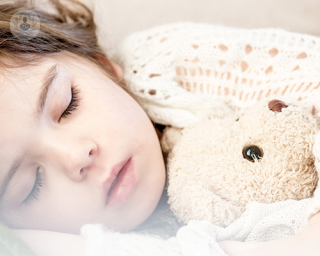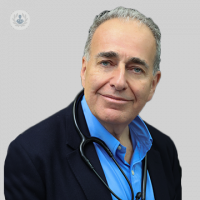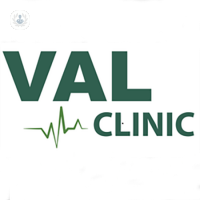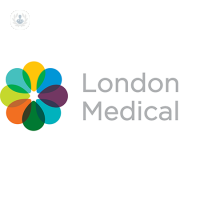What is asthma in children?
Asthma is a common pulmonary condition that often begins during childhood. The lungs and airways become inflamed and produce mucus when exposed to certain triggers. Common triggers include allergies, colds and exercise.

What are the symptoms?
- Difficulties breathing or shortness of breath
- Tightness in the chest
- Congestion
- Intermittent coughing
- Wheezing and a high-pitched sound when exhaling
Some symptoms may worsen at night, get worse over time or worsen with seasonal changes.
Other, less obvious symptoms can include:
- Trouble breathing when exercising
- Trouble sleeping caused by coughing, wheezing or breathing difficulties
- Delayed recovery from bronchitis or a respiratory infection
How can it be diagnosed?
It can be difficult to diagnose your child’s asthma. Bouts of coughing and wheezing could also be signs of a different respiratory problem. Doctors will look at the child’s medical history, symptoms, allergies and ask questions about their breathing, how long symptoms last and how often they occur.
Diagnostic tests might include the following:
- Blood test; to look for elevated numbers of white blood cells that indicate that an infection is present
- Chest x-ray; to reveal changes in the lungs when asthma is severe
- Allergy test; a skin or blood test to indicate that your child is allergic to a specific allergen
You should take your child to the doctor if they display symptoms like those mentioned above; constant coughing, wheezing, breathlessness, tightness in the chest and repeated episodes of chest infections.
Seek emergency medical help if your child:
- Has trouble breathing suddenly
- Is using their abdominal muscles to breathe
- They have an increased heartbeat
- Are sweating and experiencing chest pain
What are the causes of asthma in children?
The exact cause of asthma is unknown, however, it is thought to be linked to a weak immune system. Other factors that are thought to play a role are genetics and environmental factors.
Some common triggers that set off symptoms of asthma include:
- Colds and respiratory infections
- Exposure to pollutants like tobacco smoke
- Allergens such as dust, pollen and pet dander
- Changes in the weather
- Physical activity
- Acid reflux
Can it be prevented?
To lower your child’s risk of developing asthma, you can take the following steps:
- Reduce their exposure to cigarette smoke
- Reduce their exposure to air pollution and asthma triggers as much as possible
- Ensure they follow a healthy diet and maintain a healthy weight
- Take them to see a doctor regularly
If your child suffers from acid reflux or heartburn, keep it under control, as this can worsen asthma symptoms.
How is asthma in children treated?
There is no cure for childhood asthma and symptoms may continue into adulthood. However, with treatment, symptoms can be kept under control, preventing further damage to the lungs. Some children may only require short term treatment with short-acting bronchodilators for immediate relief of symptoms if their asthma is mild and intermittent. However long term medication will be needed for children with recurring bouts of asthma. Long term medication to control the asthma is administered in the form of corticosteroid inhalers. The dosage may change over time, depending on the severity of your child’s symptoms.
Sometimes other treatments might accompany inhalers if they initially prove ineffective on the own, such as:
- Leukotriene modifiers; taken in chewable form or as a powder
- Long-acting beta agonists, which can be inhaled with the corticosteroid inhaler
- Cromolyn; a drug that can be inhaled along with the corticosteroids to reduce inflammation
- Oral corticosteroids; only taken when other medications have proved unsuccessful
Monitoring and recording your child’s asthma and symptoms and controlling asthma triggers, keeping the house dust free and clean and teaching your child what to do if they have an asthma attack are all very important to keeping asthma under control.
Asma nei bambini
What is asthma in children?
Asthma is a common pulmonary condition that often begins during childhood. The lungs and airways become inflamed and produce mucus when exposed to certain triggers. Common triggers include allergies, colds and exercise.

What are the symptoms?
- Difficulties breathing or shortness of breath
- Tightness in the chest
- Congestion
- Intermittent coughing
- Wheezing and a high-pitched sound when exhaling
Some symptoms may worsen at night, get worse over time or worsen with seasonal changes.
Other, less obvious symptoms can include:
- Trouble breathing when exercising
- Trouble sleeping caused by coughing, wheezing or breathing difficulties
- Delayed recovery from bronchitis or a respiratory infection
How can it be diagnosed?
It can be difficult to diagnose your child’s asthma. Bouts of coughing and wheezing could also be signs of a different respiratory problem. Doctors will look at the child’s medical history, symptoms, allergies and ask questions about their breathing, how long symptoms last and how often they occur.
Diagnostic tests might include the following:
- Blood test; to look for elevated numbers of white blood cells that indicate that an infection is present
- Chest x-ray; to reveal changes in the lungs when asthma is severe
- Allergy test; a skin or blood test to indicate that your child is allergic to a specific allergen
You should take your child to the doctor if they display symptoms like those mentioned above; constant coughing, wheezing, breathlessness, tightness in the chest and repeated episodes of chest infections.
Seek emergency medical help if your child:
- Has trouble breathing suddenly
- Is using their abdominal muscles to breathe
- They have an increased heartbeat
- Are sweating and experiencing chest pain
What are the causes of asthma in children?
The exact cause of asthma is unknown, however, it is thought to be linked to a weak immune system. Other factors that are thought to play a role are genetics and environmental factors.
Some common triggers that set off symptoms of asthma include:
- Colds and respiratory infections
- Exposure to pollutants like tobacco smoke
- Allergens such as dust, pollen and pet dander
- Changes in the weather
- Physical activity
- Acid reflux
Can it be prevented?
To lower your child’s risk of developing asthma, you can take the following steps:
- Reduce their exposure to cigarette smoke
- Reduce their exposure to air pollution and asthma triggers as much as possible
- Ensure they follow a healthy diet and maintain a healthy weight
- Take them to see a doctor regularly
If your child suffers from acid reflux or heartburn, keep it under control, as this can worsen asthma symptoms.
How is asthma in children treated?
There is no cure for childhood asthma and symptoms may continue into adulthood. However, with treatment, symptoms can be kept under control, preventing further damage to the lungs. Some children may only require short term treatment with short-acting bronchodilators for immediate relief of symptoms if their asthma is mild and intermittent. However long term medication will be needed for children with recurring bouts of asthma. Long term medication to control the asthma is administered in the form of corticosteroid inhalers. The dosage may change over time, depending on the severity of your child’s symptoms.
Sometimes other treatments might accompany inhalers if they initially prove ineffective on the own, such as:
- Leukotriene modifiers; taken in chewable form or as a powder
- Long-acting beta agonists, which can be inhaled with the corticosteroid inhaler
- Cromolyn; a drug that can be inhaled along with the corticosteroids to reduce inflammation
- Oral corticosteroids; only taken when other medications have proved unsuccessful
Monitoring and recording your child’s asthma and symptoms and controlling asthma triggers, keeping the house dust free and clean and teaching your child what to do if they have an asthma attack are all very important to keeping asthma under control.


Breathing difficulties while sleeping: how can I help my child?
Mr Christopher Pepper
2025-01-18
If children experience breathing difficulties while they sleep, they can suffer from a wide range of symptoms, as explained by consultant paediatric ENT surgeon Mr Christopher Pepper in his latest article below. Mostrare di più


Asthma in children: Symptoms and diagnosis
Professor Helen Brough
2025-01-18
A persistent dry cough as well as breathing difficulties and wheezing can be a signs of allergic asthma in children. In this informative article, hgihly esteemed consultant paediatric allergist Dr Helen Brough expertly explains how asthma is diagnosed in very young children and how the condition differs in adults. Mostrare di più


Asthma in children
Dr Mugilan Anandarajan
2025-01-16
If you suspect your child has asthma, this article with leading consultant paediatrician Dr Mugilan Anandarajan provides a useful, expert guide to symptoms, causes and diagnosis, among many other important points. Mostrare di più

Childhood asthma guidelines for parents
Dr Robert Boyle
2025-01-14
Asthma is a common condition that afflicts adults and children alike, but how does childhood asthma develop and what are the signs, as parents, to look out for? Dr Robert Boyle is a paediatric allergist and all-around expert in treating asthma, and here he shares the key points about childhood asthma that parents and caregivers should be aware of. Mostrare di più
Medici esperti in Asma nei bambini
-
Dr Mark Rosenthal
Pneumologia pediatricaEsperto in:
- Bronchiolite
- Disturbi del sonno
- Asma nei bambini
- Pneumonia nei bambini
- Tosse cronica
- Infezione toracica
-
Dr Ramnik Mathur
PediatriaEsperto in:
- Reazioni allergiche
- Neonatologia
- Dolori addominali nel bambino
- Mal di testa
- Asma nei bambini
- Eczema
-
Dr Bhupinder Singh Sihra
AllergologiaEsperto in:
- Prove allergiche
- Asma nei bambini
- anafilassi
- Orticaria allergica
- Malattie respiratorie
- Sibili
-
Professor Gideon Lack
Allergologia infantileEsperto in:
- Asma nei bambini
- Reazioni allergiche
- anafilassi
- Immunoterapia
- Allergia agli alimenti
- febbre da fieno
-
Dr Theofilos Polychronakis
PediatriaEsperto in:
- Problemi respiratori
- Tosse cronica
- Disturbi del sonno
- Asma nei bambini
- infezioni respiratorie
- Rinite
- Visualizzare tutti

VAL Clinic
VAL Clinic
39 Frederick Rd, Rainham, RM13 8NJ
No existe teléfono en el centro.
Se utilizzi questo numero di Top Doctors autorizzi al trattamento dei dati a fini statistici e commerciali. Per maggiori informazioni, leggi la nostra l’informativa sulla privacy
Top Doctors

London Medical
London Medical
49 Marylebone High Street, W1U 5HJ
No existe teléfono en el centro.
Se utilizzi questo numero di Top Doctors autorizzi al trattamento dei dati a fini statistici e commerciali. Per maggiori informazioni, leggi la nostra l’informativa sulla privacy
Top Doctors

77 Wimpole Street
77 Wimpole Street
77 Wimpole Street, London. W1G 9RU
No existe teléfono en el centro.
Se utilizzi questo numero di Top Doctors autorizzi al trattamento dei dati a fini statistici e commerciali. Per maggiori informazioni, leggi la nostra l’informativa sulla privacy
Top Doctors
-
VAL Clinic
39 Frederick Rd, Rainham, RM13 8NJ, East LondonEsperto in:
- Cardiologia
- Chirurgia bariatrica
- Chirurgia ortopedica
- Dermatologia
- Ginecologia e Ostetricia
- Medicina interna
-
London Medical
49 Marylebone High Street, W1U 5HJ, Central LondonEsperto in:
- Cardiologia
- Diabete dell'adulto
- Diabete infantile
- Endocrinologia
- Medicina di famiglia
- Oftalmologia
-
77 Wimpole Street
77 Wimpole Street, London. W1G 9RU, W1G Marylebone LondonEsperto in:
- Homecare
- Cardiologia
- Cardiologia preventiva
- Malattia cardiovascolare
- Malattie respiratorie
- Ipertensione
- Visualizzare tutti







